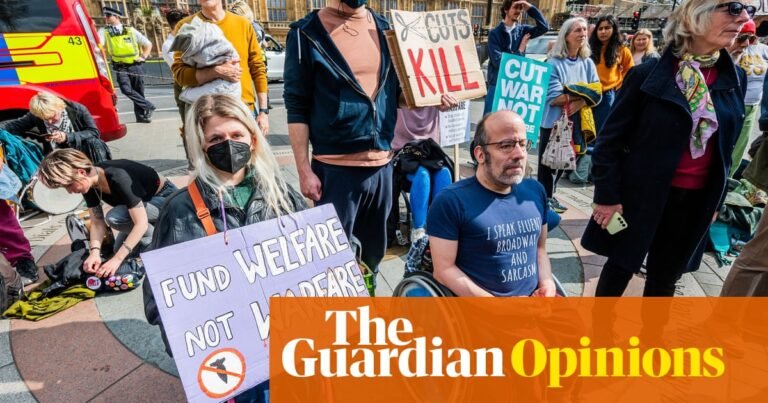In March 2020, when the Conservative government looked like an outlier in appearing to pursue a Covid strategy centring on herd immunity, for the first time in my life I felt raw, hot fear. Thinking of my toddler and what might happen if I caught coronavirus and was treated under the then Nice guidelines “frailty” score was too much. I sobbed deeply. After 10 years of austerity, I knew then that disabled people would pay an enormous price for the pandemic thanks to the government’s handling of it. Disabled people did: almost 60% of Covid-related deaths involved disabled people in that first wave.
I vowed then that I would do all I could to use my skills and experiences of 20 years working in disability law and policy to deliver a country that treats disabled people with dignity and respect. Five years later, I am one of the only visibly physically disabled members of parliament. I was proud to be elected last year as the first person to have grown up in my constituency to go on to represent it in parliament for more than a century. I am proud, too, that Labour’s manifesto committed to championing the rights of disabled people, and to the principle of working with disabled people to ensure our views and voices are at the heart of all we do.
Consequently, since April, I have been engaging relentlessly with government, at the very highest level, to change its proposals as set out in the universal credit and personal independence payment bill. I made it clear from the start I could not support the proposals on personal independence payments (Pip). Pip is an in-work benefit, designed to ensure disabled people can live independently.
There are 4 million disabled people in poverty in the UK. As a matter of conscience, I could not support measures that would push 250,000 disabled people, including 50,000 children, into poverty. Nor could I accept proposals that used a points system, under current descriptors, that would exclude eligibility for those who cannot put on their underwear, prosthetic limbs or shoes without support.
The concessions now announced are significant, including that all recipients of Pip who currently receive it will continue to do so. I know this will be an enormous relief for many of my nearly 6,000 constituents in receipt of Pip and for disabled people across the country.
However, I will continue working, as I have done from the beginning, to look at these concessions carefully against the evidence on the impact upon disabled people, including my constituents, and disabled people’s organisations.
Fundamentally, I will be looking for further reassurances that the detail will fulfil Labour’s manifesto commitments to disabled people. The social model of disability must be central to this – removing barriers to our inclusion in society.
Proposals must take a mission-led approach across all five missions to break down barriers to opportunity for disabled people. I hope to see three things from government, embedded in the text of the amendments, if the bill reaches the report stage.
First, the review being led by Stephen Timms, the minister for social security and disability, must not be performative. The government must not make the same mistake twice. I strongly recommend bringing in a disabled expert on equality and employment law, such as Prof Anna Lawson at the University of Leeds, to support this work.
Second, the government must consult disabled people over the summer to understand the impact of the proposed changes from November 2026 on future claimants. These must mitigate risks of discrimination for those current recipients with similar disabilities and against pushing new disabled claimants into poverty after November 2026. In doing so, it must produce an impact assessment that also reflects the impact of unmet need for future recipients on health and social care services, and clarifies the application of new criteria on those receiving Pip if they get reassessed.
Third, growth must mean inclusive growth. In implementing the £1bn employment, health and skills support programme, there needs to be a clear target for closing the disability employment gap. Importantly, there needs to be a commitment to a sector-by-sector strategy on closing this gap and a skills training strategy for the employment support workers enabling disabled people into work.
These approaches outperform cuts or sanctions in getting disabled people into sustainable employment.
This matters. The Conservatives left us with a pitiful 29% employment gap and 17% pay gap for disabled people. The Labour government has an opportunity to bring in a new era of policymaking for disabled people that takes a laser focus in closing this gap. The disability sector believes that this can be reduced by 14%; generating £17.2bn for the exchequer. We must seize this moment to do things differently and move beyond the damaging rhetoric and disagreements of recent weeks.
In line with the prime minister’s statement that reform should be implemented with Labour values of fairness, a reset requires a shift of emphasis to enabling disabled people to fulfil their potential. I will continue to engage with government and disabled people’s organisations, to fight for a country that treats disabled people with dignity and respect.
-
Marie Tidball is Labour MP for Penistone and Stocksbridge, chair of the all-party parliamentary group on autism and co-chair of the disability parliamentary Labour party
-
Do you have an opinion on the issues raised in this article? If you would like to submit a response of up to 300 words by email to be considered for publication in our letters section, please click here.
